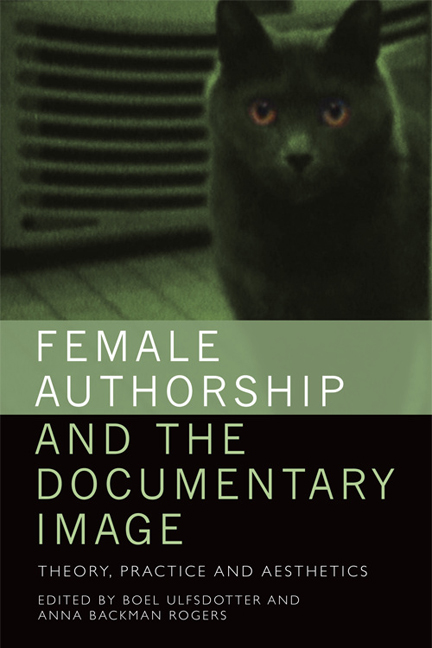Book contents
- Frontmatter
- Contents
- List of Illustrations
- Notes on the Contributors
- Foreword
- Introduction
- PART ONE DOCUMENTARY PRACTICES
- PART TWO DOCUMENTARY THEORIES
- PART THREE FEMALE AUTHORSHIP AND GLOBAL IDENTITIES
- ‘Being a Woman Documentary Maker in Taiwan’ – An interview with Singing Chen and Wuna Wu
- Select Bibliography
- Index
7 - The Other, The Same: Towards a Metamodern Poetics with Heddy Honigmann
Published online by Cambridge University Press: 05 May 2021
- Frontmatter
- Contents
- List of Illustrations
- Notes on the Contributors
- Foreword
- Introduction
- PART ONE DOCUMENTARY PRACTICES
- PART TWO DOCUMENTARY THEORIES
- PART THREE FEMALE AUTHORSHIP AND GLOBAL IDENTITIES
- ‘Being a Woman Documentary Maker in Taiwan’ – An interview with Singing Chen and Wuna Wu
- Select Bibliography
- Index
Summary
What is it to be a woman? To be a woman is to have been born with a female sex. To be a woman is to live in a female body. It's me, my whole body is me. I am not limited to the hot spots of men's desire. I am not a sex and breasts. I am a female body. To be a women is also having a head of a woman. But a head that thinks otherwise than a man's head. Even if I find it difficult to find myself, to define myself in a society of men.
Agnès Varda, Women Reply: Our Body Our Sex (Réponse des femmes: notre corps, notre sexe, France, Ciné Tamaris, cine-pamphlet, 1975)Given that the ‘female gaze’ was chosen as the central theme of the IDFA (International Documentary Film festival Amsterdam) of 2014, it came as no surprise that Heddy Honigmann was invited to speak on this subject as its special guest. Only one year earlier, Honigmann had received The Living Legend Award of the IDFA, an oeuvre prize that was presented to her by the sole previous recipient, American documentary maker Frederick Wiseman. By then, her rich body of work had already garnered numerous international awards, three of which were conferred for her life achievement: The van Praag Award from the Dutch Humanist Association (2005), the Hot Docs Outstanding Achievement Award (2008), the Golden Gate Persistence of Vision Award (2007). In 2015, her status as an authority in the field of documentary resulted in a fellowship of the Royal Dutch Academy of Sciences and Arts (KNAW – Academie voor de Kunsten).
Honigmann (b. 1951, Lima) is frequently denoted as a Peruvian-Dutch filmmaker, but even this is a simplification of the transcultural identity that clearly manifests itself in her work. She was born and raised in Peru as a child of Eastern European Jewish Holocaust survivors. She attended a French secondary school in Lima, studied literature for a few years and started working as a poet. After travelling around the world for some time, she studied filmmaking, specialising in documentary at the Centro Sperimentale di Cinematografia in Rome. In 1978, love led her to Amsterdam, where she has resided ever since.
- Type
- Chapter
- Information
- Female Authorship and the Documentary ImageTheory, Practice and Aesthetics, pp. 127 - 143Publisher: Edinburgh University PressPrint publication year: 2018



